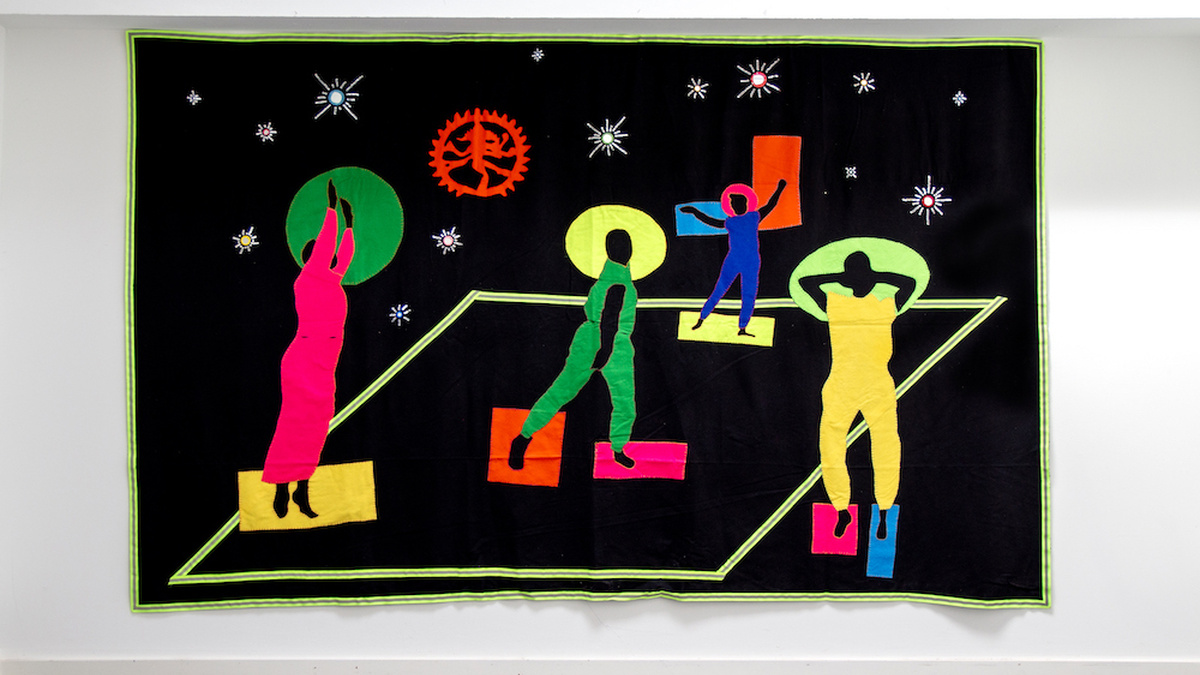Jalsaghar: ‘Present’-ing the Future / Recognizing the Past
A Garland of Songs
Tue 8 October 2024

Wheelchair accessible

Naach, Appliqué Felt on Blackout fabric, mirrors, hi vis tape. Photo by Oana Stanciu.
Debjani Banerjee in conversation with Dr. Ranjana Thapalyal. Taking the title from Rabindranath Tagore’s 1910 collection of poetry ‘Geetanjali’, we’ll be talking about the exhibition, its sources and inspirations, the significance of music in Banerjee’s work, of Tagore’s indelible presence in Bengali society, and the multiple cultural and political sites of the British South Asian experience.
Workshop: Music and Memory
With Debjani Bannerjee
Participants will be invited to work in small groups to share favourite pieces of music that for them resonate with their sense of where they come from. All interpretations of the invitation are welcome, whether a chosen piece comes from a physical geographical location, is current or archival, or is simply part of a musical genre that feels like ‘home’. The invitation will remain live throughout the series of talks.
‘Present’-ing the Future / Recognizing the Past
A four-part immersion into historical and cultural themes in Debjani Banerjee’s Jalsaghar by Dr. Ranjana Thapalyal and guests
The references in Jalsaghar are rich and varied, encompassing the classics of ancient Indian literature, their presence in pop culture, and the politics of migration rooted in Britain’s colonial history. Most vividly, Jalsaghar brings before us the vibrant characters of the Mahabharata, India’s c. second-century BCE epic, a complex and intricately woven tale that has been told, retold, and passionately discussed through the ages. Contemporary interpretations and critiques abound, both in everyday conversations and academic studies. Banerjee’s selection of characters from the Mahabharata float alongside snippets of recent British political history, with its long reach back to colonial-era decisions. These characters also resonate with themes of migration and personal diasporic experience, of belonging, and the transgressions required to assert hybrid cultural identities. This series of workshops and talks delves into these subjects with the aim of critically contextualising them, exploring connections to contemporary questions about community, human relations, spirituality, and art’s role in reflecting on all of this.
There will be four sessions of 2 hours, each consisting of a talk and a practical workshop. We suggest you attend all four sessions to get a more in-depth sense of the issues and ideas we will touch on, but if this is not possible, you are welcome to attend a selection.
About the artists and workshop leaders
Dr. Ranjana Thapalyal
Dr. Ranjana Thapalyal is an Indian born inter-disciplinary artist and academic, based in Glasgow, Scotland. Her practice spans ceramics, painting, collaborative performance, creative and critical writing. Research has played a significant role in her work, focussed on the nature of materials themselves in the early work, to broader philosophical concerns leading to written publications and collaborations. Of particular interest are concepts of ‘self’ in South Asian and West African traditions, feminist readings of ancient philosophies of the South, cultural politics and the development of decolonising, anti-racist strategies for art pedagogy.
India Boxall
India is a creative researcher and facilitator whose work explores transdisciplinary practices and diffractive pedagogies. Her interests lie in subverting conventional notions of theory, matter, and language, viewing knowledge creation as an active, kaleidoscopic practice for the multifaceted self. This practice spans drawings, textiles, sculpture, text, and digital media, often incorporating unconventional materials. She is a co-conspirator of MUCK (Must Use Critical Knowledge), an online archive dedicated to critical art writing and visual practices.
Rudy Kanhye
Rudy Kanhye is a disabled artist and researcher from the global majority working between Mauritius, France and Scotland. His research interests include archives, memories, oral histories, extending this focus through Mauritius Island, the Global South and its neo-colonial relationship to the West. Born in Dijon, France and a descendent of Mauritian Indian indentured immigrants, he experiments with collaborative, interactive artworks which re-imagine archival research at the intersections between race, disability and the environment and the collective memories of migrant communities.
His recent focus has been on uncovering the hidden history of the labour system and the involvement of the British Empire and Scotland, to create a framework for increasing diversity, including interpretation of the legacy of the post-slavery system of indentured labour.
Shalmali Shetty
Shalmali Shetty is an independent curator, writer and artist working between the UK and India. Her research interests include themes of archives, memories and material culture studies. She intends to coalesce her backgrounds in art practice and theory in the production of the curatorial. She is the recipient of the Visual Arts and Craft Makers Award, Glasgow (2022); the Skinny Magazine x Edinburgh Art Festival Emerging Writers, Edinburgh (2023), and the Art South Asia Project x Serendipity Arts Foundation Curatorial Research Fellowship, UK and India (2023).
Kapil Seshasayee
Kapil Seshasayee is a British Tamil artist fusing r&b, south indian classical and experimental rock music.